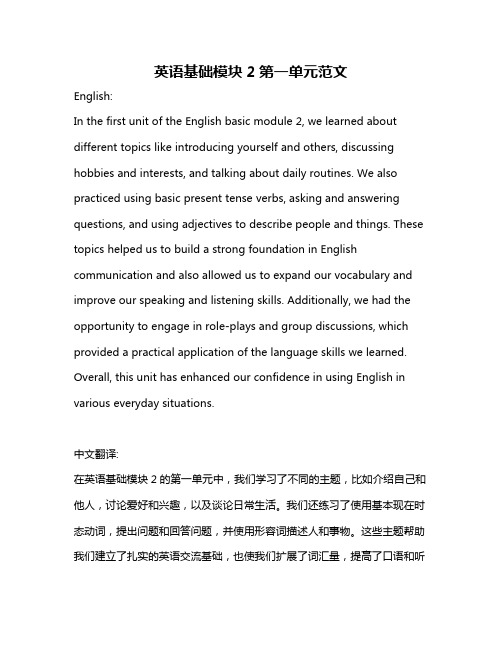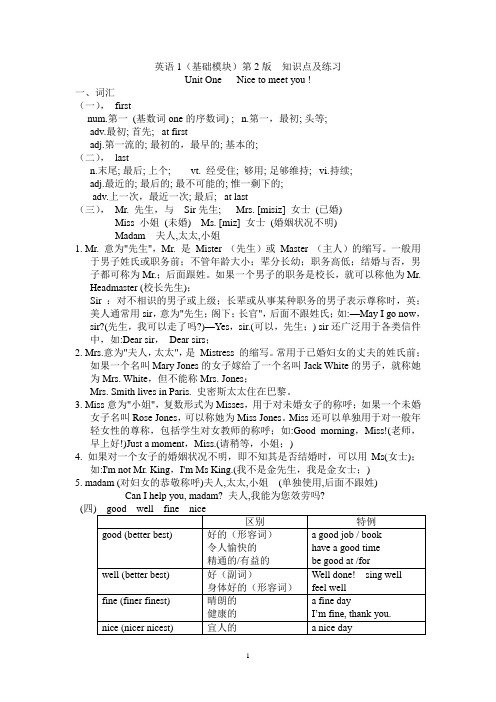《英语》(基础模块)(修订版)第二册第一单元
《英语》(基础模块)第二册(外语教学与出版社)教案unit1,1

I. Help the students learn the new words and expressions by reading aloud after the recorder.
II. Ask the students to listen to the conversation on page3.
科目:英语
教案
班级:数控1202、电子1202电子1201、物流1202
教师:郭池林
专业部:电子
四川省宜宾市南溪职业技术学校
201 3 —2014学年上期
第1讲
章节
标题
Unit 1 Nice to Meet You!
授课日期
课时
2
教学内容
目标
To understand the dialogue.
To master the functional sentences related to the topic.
allow, introduce, manager,England, project, equipment…
II. Ask the students to listen to the dialogue again and finish Exercise 3 on page 3.
III. Ask the students to read the dialogue in pairs and act it out.
1. When you meet someone for the first time, what will you do?
2. How do westerners usually greet each other when they meet?
英语基础模块2第一单元范文

英语基础模块2第一单元范文English:In the first unit of the English basic module 2, we learned about different topics like introducing yourself and others, discussing hobbies and interests, and talking about daily routines. We also practiced using basic present tense verbs, asking and answering questions, and using adjectives to describe people and things. These topics helped us to build a strong foundation in English communication and also allowed us to expand our vocabulary and improve our speaking and listening skills. Additionally, we had the opportunity to engage in role-plays and group discussions, which provided a practical application of the language skills we learned. Overall, this unit has enhanced our confidence in using English in various everyday situations.中文翻译:在英语基础模块2的第一单元中,我们学习了不同的主题,比如介绍自己和他人,讨论爱好和兴趣,以及谈论日常生活。
英语基础模块2第一单元教案1.3

宁德职业技术学院教学过程与内容:Ⅰ. GreetingⅡ. Revision1. Collect the Ss’ homework and get some of them to tell others key phrases of what they will talk today. Get others to guess.S1(Li Jie): went swimming bathed in the sun walked along the beachT: What did Li Jie do last vacation?S2: She went swimming, bathed in the sun and walked along the beach.T: Where did she go?S3 to S1: Did you go to Sanya?S1: No, I didn’t.S4 to S1: Did you go to Qingdao?S1: No, I didn’t. I went to Thailand.T: Who did she go with?S5 to S1: Did you go with your parents?S1: Yes, I did.(设计意图:这一步骤教师既能对学生的作业情况进行及时地检查,教师在并听的过程中边提出问题,并且问题是结合上一课时的知识点,又可以检查学生们对于一般过去时的掌握情况。
教师让说的学生故弄玄虚,不把完整的信息全部告诉大家,更增添了其他同学的好奇心,鼓励学生用上一课时学过的句型进行提问和回答。
教师因此也达到了复习一般过去时的目的。
同时,教师也为下一班即将要进行的表演做了铺垫。
)2. Present the phrases the Ss mentioned and make a list, omitting the verbs.(设计意图:教师把学生所说到的短语,列在一张表格中,把动词省略掉。
英语基础模块第二版第二册Unit_1

7. Look and talk.
Harbin
cold / went skating / terrible
A: Where did you go? B: A: What was the weather like? B: A: What did you do there? B: A: Did you enjoy yourselves? B:
Yours, Bob
10. Read and tick.
Dear Family Life,
My mother is a typical housewife and she does nearly all the housework.
My father is an engineer and he never does any family chores.
11. Read and tick.
Bob’s mother ● went out for her daily run ● went shopping ● slipped and hit her head
Ben’s father
□ □ ● went to the supermarket □ □ ● counted what he bought □ □ ● cooked for Ben’s mother
10. Read and tick.
Dear Family Life, My mother is a career woman, but she never forgets her household
duties. One snowy morning, she went out for her daily run. When she returned
英语2(基础模块)(第2版)Unit 1课件

你的假期过得怎么样啊?
It was wonderful / great / not bad. 很精彩/很棒/不错。
We had great fun.
我们玩得很开心。
Where did your family go?
你们一家去哪儿了?
What did you do there?
你们在那里都玩了什么?
9. Think and discuss.
Yours,
Ben
10. Read and tick.
In their letters, both Ben and Bob talk about:
( ) health ( ) problems ( ) family stories
( ) school ( ) friendship ( ) travel
11. Read and tick.
Bob’s mother ● went out for her daily run ● went shopping ● slipped and hit her head
Ben’s father
□ □ ● went to the supermarket □ □ ● counted what he bought □ □ ● cooked for Ben’s mother
7. Look and talk.
Example: A: Where did you go? B: I went to Hainan. A: What was the weather like? B: It was hot. A: What did you do there? B: We went swimming. A: Did you enjoy yourselves? B: Yes, I did. It was wonderful.
英语1(基础模块)第2版 unit 1 知识点及练习

英语1(基础模块)第2版知识点及练习Unit One Nice to meet you !一、词汇(一),firstnum.第一(基数词one的序数词) ; n.第一,最初; 头等;adv.最初; 首先; at firstadj.第一流的; 最初的,最早的; 基本的;(二),lastn.末尾; 最后; 上个; vt. 经受住; 够用; 足够维持; vi.持续;adj.最近的; 最后的; 最不可能的; 惟一剩下的;adv.上一次,最近一次; 最后; at last(三),Mr. 先生,与Sir先生; Mrs. [misiz] 女士(已婚)Miss 小姐(未婚) Ms. [miz] 女士(婚姻状况不明)Madam 夫人,太太,小姐1. Mr. 意为"先生",Mr. 是Mister (先生)或Master (主人)的缩写。
一般用于男子姓氏或职务前;不管年龄大小;辈分长幼;职务高低;结婚与否,男子都可称为Mr.;后面跟姓。
如果一个男子的职务是校长,就可以称他为Mr.Headmaster (校长先生);Sir :对不相识的男子或上级;长辈或从事某种职务的男子表示尊称时,英;美人通常用sir,意为"先生;阁下;长官",后面不跟姓氏;如:—May I go now,sir?(先生,我可以走了吗?)—Yes,sir.(可以,先生;) sir还广泛用于各类信件中,如:Dear sir,Dear sirs;2. Mrs.意为"夫人,太太",是Mistress 的缩写。
常用于已婚妇女的丈夫的姓氏前;如果一个名叫Mary Jones的女子嫁给了一个名叫Jack White的男子,就称她为Mrs. White,但不能称Mrs. Jones;Mrs. Smith lives in Paris. 史密斯太太住在巴黎。
3. Miss意为"小姐",复数形式为Misses,用于对未婚女子的称呼;如果一个未婚女子名叫Rose Jones,可以称她为Miss Jones。
基础模块2-英语-unit1 (1)

英语基础模块2课程电子教案(理论课)
(设计意图:这一游戏要求学生按照已给的例子,把其他的单词放进正确的信封中。
这里其实在复习动词的过
去式的变化规则。
而采用游戏和竞赛的方式,可以化枯燥为有趣,让学生在玩中学、做中学。
在学生把这些单词全部放入正确的位置后,可以让他们自己来归纳动词过去式的变化规则。
教师还可以在这里让学生
played
studied stopped
went da 一般直接+ed 以不发音e 结尾+d 以辅音字母+y ,则去y 加ied 重读闭音节结尾,双写最后一个字母,然后+ed
(设计意图,找出课文中的关键活动,初步理解课文。
)
3. Activity 12. Read the letters again and tick the correct sentences. Then check the answers with the Ss. See if they have any problems, help them with some important and difficult points.
Li Jie
danced
in the
classroom
last night。
英语(基础模块)第二册Unit 1练习题

Unit 1I. 听力。
1. 听录音,填单词。
1. Mr. Chen is the of our company.2. We have bought some new .3. It’s a great to meet you here.4. Please give my regards to your .5. You should not ask people about their and income.6. My father works as an in a factory.7. Thank you for you’ve done for me.8. How is your new going?9. I’m glad that you can come and us.10. We’re going to meet Mr. White at the .11. He met Mr. Chen at a meeting in London last .12. We’re going to see John at the airport.13. We must follow some basic .14. We’re to have Mr. Smith here with us.15. Let me Mr. Green, the engineer from England. 2. 听录音,选择正确答案。
Jennifer: Good morning! 1Li Hong: Good morning, Miss Jennifer.Jennifer: Well, Jennifer is my first name. My last name is Smith.2Li Hong: Thank you, Miss Smith.Jennifer: May I have your name, please? 3Li Hong: Li Hong.Jennifer: OK. Li Hong?Li Hong: I’m nineteen and now I’m a bank clerk. But I want to be a secretary.Jennifer: I see. 4Li Hong: Yes, 5Jennifer: That’s fine. Thank you. We’ll let you know our decision later.J : What are you going to do after leaving school?D: I am thinking about becoming a guide. I would like to explore strange things.J : 1D: Of course, I do. 2J : That’s good. You seem to be good at spoken English. Is that right? D: Just so-so. I’ll try to learn it better. 3J : Maybe I’ll be a P.E. teacher. 4D: 53. 听录音,给下面句子排序。
- 1、下载文档前请自行甄别文档内容的完整性,平台不提供额外的编辑、内容补充、找答案等附加服务。
- 2、"仅部分预览"的文档,不可在线预览部分如存在完整性等问题,可反馈申请退款(可完整预览的文档不适用该条件!)。
- 3、如文档侵犯您的权益,请联系客服反馈,我们会尽快为您处理(人工客服工作时间:9:00-18:30)。
外研版基础模块(修订版)第二册
Unit 1 Nice to meet you! 一、单元整体解读及分析
二、分课时教学设计
第一课时
Pre-listening:
头脑风暴:
We have met many familiars. Now I will introduce a new comer David to
What did we learn today?根
第二课时
While-reading:
Pre-listening:
1)对话练习:
Mr. Brown is our new foreign teacher from the US. Let’s introduce him to Ms. Xie, the assistant of our headteacher.
What key sentences or phrases they used in the dialogue?
教师把学生的回答板书在黑板
What did we learn today?
第三课时
While-reading:
2)第二遍阅读4)致欢迎辞
)信息填空②
阅读活动⑤Read and learn
Writing:
)自我信息填空
连词成句
Make sentences with your own
第四课时
While-reading:
第一遍阅读
Introduce Mark Tayor to us. If
)第二遍阅读
Introduce Lisa Wang to us. If you need, you can use
on the blackboard.
Writing:
Around the world
Pre-reading:
中国式寒暄
What do we do to greet others? While-reading:
Reading :
发音模仿:
教师播放/k/ 和/g/
频,请学生模仿。
Arrange your notebook.
作者简介:沈碧红,浙江省慈溪职业高级中学教师。
曾获第一届“外研社杯”全国中职英语教师教学技能大赛一等奖和“外研社杯”全国教学设计评比二等奖,慈溪市第九届“教坛新秀”,第六届中青年学科“骨干教师”,市先进德育工作者,第五届“十佳班主任”。
